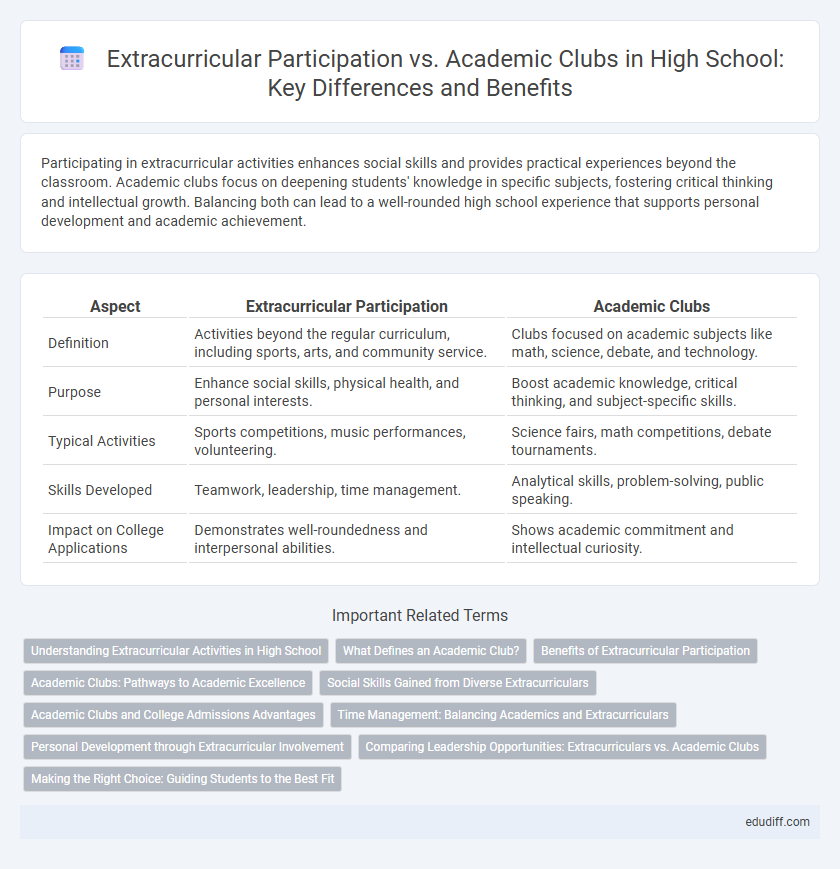Participating in extracurricular activities enhances social skills and provides practical experiences beyond the classroom. Academic clubs focus on deepening students' knowledge in specific subjects, fostering critical thinking and intellectual growth. Balancing both can lead to a well-rounded high school experience that supports personal development and academic achievement.
Table of Comparison
| Aspect | Extracurricular Participation | Academic Clubs |
|---|---|---|
| Definition | Activities beyond the regular curriculum, including sports, arts, and community service. | Clubs focused on academic subjects like math, science, debate, and technology. |
| Purpose | Enhance social skills, physical health, and personal interests. | Boost academic knowledge, critical thinking, and subject-specific skills. |
| Typical Activities | Sports competitions, music performances, volunteering. | Science fairs, math competitions, debate tournaments. |
| Skills Developed | Teamwork, leadership, time management. | Analytical skills, problem-solving, public speaking. |
| Impact on College Applications | Demonstrates well-roundedness and interpersonal abilities. | Shows academic commitment and intellectual curiosity. |
Understanding Extracurricular Activities in High School
Extracurricular activities in high school encompass a broad range of pursuits beyond academic clubs, including sports, arts, community service, and leadership organizations that enhance social skills and personal development. While academic clubs focus on subject-specific interests such as science, math, or debate, extracurricular participation fosters teamwork, time management, and real-world experience crucial for college applications and career readiness. Engaging in diverse extracurricular activities promotes well-rounded growth, helping students balance academics with passions and build a dynamic high school experience.
What Defines an Academic Club?
Academic clubs are defined by their focus on subject-specific learning, intellectual growth, and skill development in areas such as science, mathematics, literature, and debate. These clubs provide students with opportunities to deepen their understanding of academic disciplines through competitions, projects, and collaborative discussions. Participation in academic clubs enhances critical thinking, problem-solving abilities, and often complements classroom learning by fostering a community of learners with shared academic interests.
Benefits of Extracurricular Participation
Extracurricular participation in high school significantly enhances social skills, leadership abilities, and time management, fostering personal growth beyond the classroom. Research shows students engaged in activities like sports, music, or volunteer work exhibit higher levels of college readiness and improved mental health. These experiences complement academic clubs by providing diverse opportunities for teamwork, creativity, and real-world problem-solving.
Academic Clubs: Pathways to Academic Excellence
Academic clubs provide high school students with targeted opportunities to deepen subject knowledge, enhance critical thinking, and prepare for advanced college coursework. Membership in academic clubs such as math team, science Olympiad, or debate club correlates with improved standardized test scores and higher GPA achievement. These clubs foster collaborative learning environments that encourage intellectual curiosity and skill development essential for academic excellence.
Social Skills Gained from Diverse Extracurriculars
Participation in diverse extracurricular activities, including both athletic teams and academic clubs, significantly enhances students' social skills by fostering teamwork, communication, and leadership abilities. Academic clubs such as debate, science Olympiad, and student government promote critical thinking and collaboration in intellectually stimulating environments, while sports and performing arts encourage interpersonal interaction and group dynamics. Engaging in a variety of extracurriculars cultivates adaptability and emotional intelligence, essential for success in both academic settings and future professional environments.
Academic Clubs and College Admissions Advantages
Academic clubs such as debate, robotics, and science Olympiad offer students opportunities to develop critical thinking, teamwork, and specialized knowledge, which are highly valued in college admissions. Participation in these clubs demonstrates commitment to intellectual growth and leadership in a focused academic area, often distinguishing applicants in competitive admissions pools. Colleges frequently seek students with proven dedication to academic pursuits, making involvement in academic clubs a strategic advantage for admissions success.
Time Management: Balancing Academics and Extracurriculars
Balancing academics and extracurricular participation requires effective time management strategies to ensure students meet both academic deadlines and club responsibilities. Academic clubs often demand focused study sessions or competitions, which complement classroom learning, while extracurricular activities such as sports or arts provide diverse developmental experiences but may consume more flexible time slots. Successful high school students allocate specific time blocks for study and activity, using planners or digital tools to optimize productivity and prevent burnout.
Personal Development through Extracurricular Involvement
Extracurricular participation in high school fosters essential personal development skills such as leadership, teamwork, and time management, which are often cultivated through diverse activities beyond academic clubs. Academic clubs primarily enhance subject-specific knowledge and critical thinking, while extracurricular involvement encourages holistic growth by promoting social skills and emotional resilience. Students engaged in varied extracurriculars typically exhibit stronger self-confidence and adaptability, critical traits for success beyond the classroom.
Comparing Leadership Opportunities: Extracurriculars vs. Academic Clubs
Leadership opportunities in extracurricular activities often emphasize team-building, event management, and community engagement, providing students with practical skills in organizing and leading diverse groups. Academic clubs focus more on intellectual leadership, where students guide research projects, lead scholarly discussions, and mentor peers in subject-specific areas. Both avenues develop critical leadership skills but cater to different interests and future career paths.
Making the Right Choice: Guiding Students to the Best Fit
Extracurricular participation offers diverse experiences that enhance social skills and personal growth, while academic clubs focus on deepening subject knowledge and preparing for future careers. Evaluating a student's interests, strengths, and long-term goals helps determine whether hands-on activities or intellectual challenges provide the best fit. Schools should provide guidance that aligns opportunities with individual aspirations, ensuring balanced development and increased engagement.
Extracurricular participation vs Academic clubs Infographic

 edudiff.com
edudiff.com